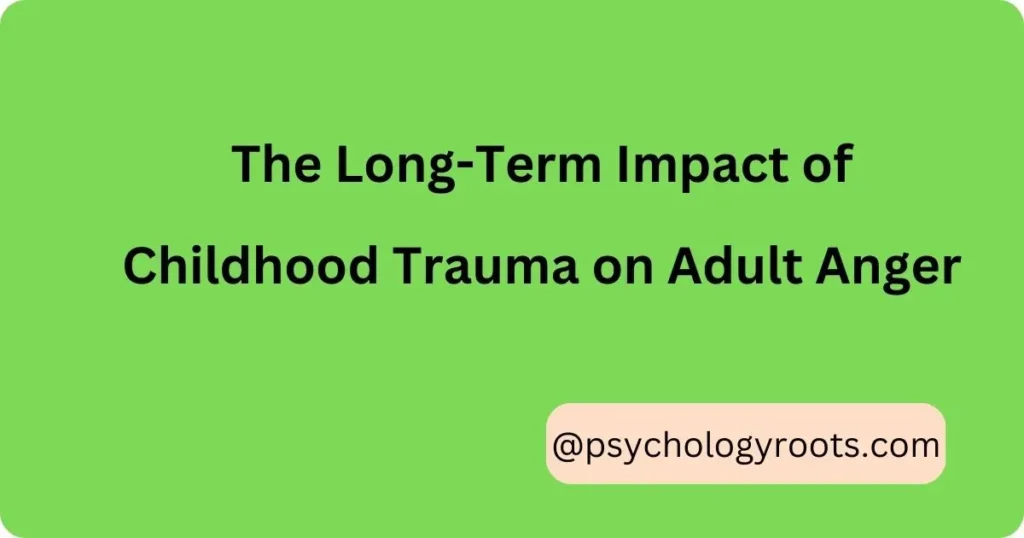Table of Contents
The Long-Term Impact of Childhood Trauma on Adult Anger
Here in this post, we are discussing “The Long-Term Impact of Childhood Trauma on Adult Anger”. You can read more about psychology-related material on our website. Keep visiting Psychology Roots.
Table of Contents
Childhood experiences wield considerable influence over an individual’s emotional well-being during adulthood. Recent research has shed light on the profound effects of childhood trauma on adult mental health. Specifically, mounting evidence suggests that individuals who have undergone significant traumatic events during their formative years may display a heightened propensity for experiencing anger-related issues later in life. Understanding the intricate nature of this relationship is pivotal for developing effective interventions and support systems to mitigate the enduring consequences of childhood trauma.

Exploring the Link:
Empirical investigations have revealed that exposure to adverse childhood experiences, including physical or emotional abuse, neglect, household dysfunction, or witnessing violence, can disrupt normal child development and impede the cultivation of adequate emotional regulation skills. The impact of trauma on the developing brain can induce enduring alterations in stress response systems, rendering individuals more susceptible to heightened anger responses in adulthood.
Childhood trauma engenders an environment conducive to the emergence of anger-related issues through several mechanisms. Primarily, it may hinder the acquisition of effective coping mechanisms, leaving individuals ill-equipped to manage anger and frustration in healthy and adaptive ways. Moreover, traumatic experiences can erode trust and impede the establishment and maintenance of stable relationships, further exacerbating feelings of anger and social isolation. Furthermore, unresolved trauma can contribute to the development of co-occurring mental health conditions such as post-traumatic stress disorder (PTSD), depression, or anxiety, which are intricately intertwined with anger-related problems.
Neurobiological Foundations:
Neurobiological investigations have begun to elucidate the underlying mechanisms through which childhood trauma influences adult anger. Prolonged exposure to stress resulting from trauma can induce structural and functional alterations in the brain, particularly within regions responsible for emotional regulation and impulse control. The amygdala, a key player in emotional processing, may become hyperactive, heightening individuals’ vulnerability to anger and aggression. Concurrently, the prefrontal cortex, involved in decision-making and self-regulation, may exhibit diminished functionality, further compromising individuals’ capacity to effectively manage anger.
Breaking the Cycle:
Recognition of the impact of childhood trauma on adult anger is a pivotal step towards interrupting the perpetuation of this cycle and facilitating the process of healing. Interventions aimed at mitigating the long-term consequences of childhood trauma should concentrate on addressing both the emotional and physiological dimensions of anger-related issues. Therapeutic modalities such as trauma-focused cognitive behavioral therapy (TF-CBT), dialectical behavior therapy (DBT), or eye movement desensitization and reprocessing (EMDR) have exhibited promise in assisting individuals in processing traumatic experiences and cultivating healthier coping strategies.
Prevention and early intervention are also vital in minimizing the impact of childhood trauma on adult anger. Implementation of trauma-informed practices in educational settings and ensuring accessibility to mental health resources for children who have experienced trauma can significantly enhance their long-term outcomes.
Conclusion:
Childhood trauma casts a protracted shadow over an individual’s emotional well-being, with anger-related issues frequently emerging as a prominent manifestation in adulthood. Comprehending the intricate relationship between childhood trauma and adult anger is critical for the development of effective interventions, support systems, and preventative measures. By providing comprehensive trauma-informed care and promoting awareness of mental health, we can work towards disrupting the cycle of trauma and fostering resilience and healing for those who have endured childhood adversity.
Help Us Improve This Article
Have you discovered an inaccuracy? We put out great effort to give accurate and scientifically trustworthy information to our readers. Please notify us if you discover any typographical or grammatical errors.
Make a comment. We acknowledge and appreciate your efforts.
If you have any scale or any material related to psychology kindly share it with us at psychologyroots@gmail.com. We help others on behalf of you.